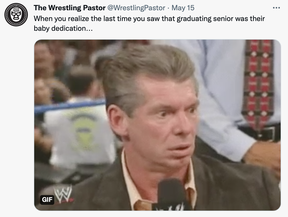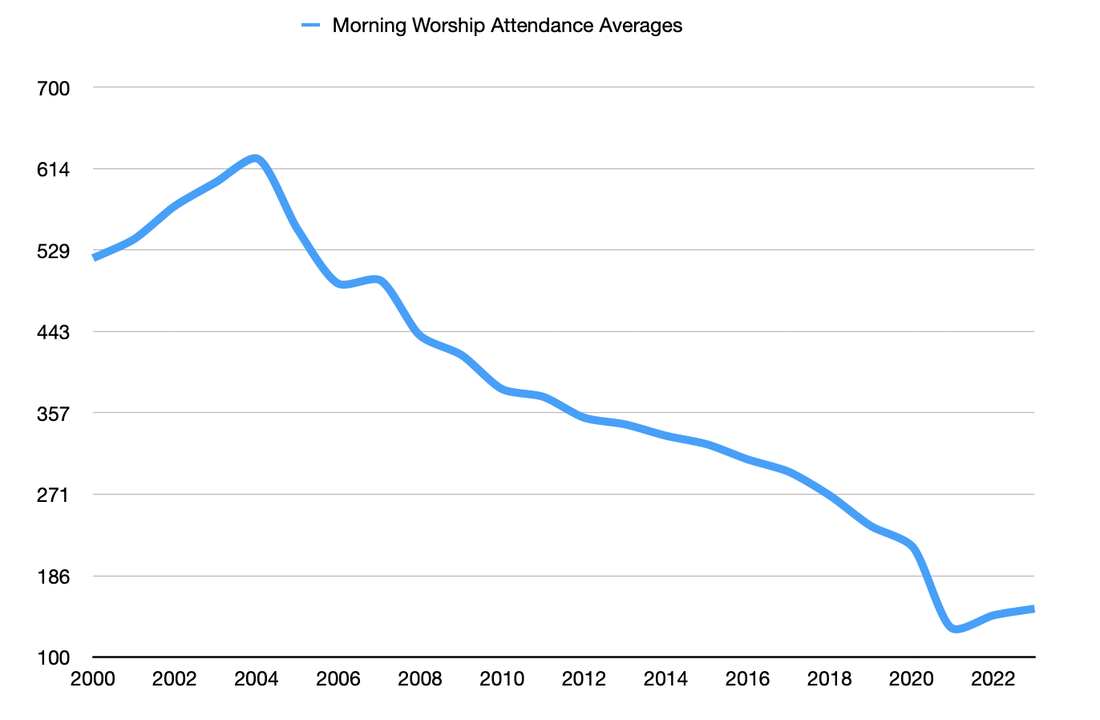 I really don’t like SBC politics and the circus that surrounds a lot of the machinations of our Convention. I love attending the Annual Meeting for the missions reports, the opportunity to affirm our cooperative missions, the chance to see old friends, and yes to grab whatever swag is in the Exhibit Hall. But I’ve also felt, at least in the last few years, a greater sense of duty to be in the hall when the decisions are made to at least let me ballot be a vote reflecting my conscience and convictions as a messenger from our church. At times I’ve voted in the minority, but for the most part I’ve been honored to cast a ballot (and get the right one out of the booklet) in joining with the overwhelming consensus of our fellow messengers. There’s much ink that’s been spilled on the last few years, and I feel a little hesitancy to add more to it. But again, as the ballot has been raised in conscience, so must some digital ink be spilled. This morning I read a very thoughtful article from a fellow SBC pastor and Louisville native, Heath Lambert from FBC Jacksonville. He’s done an incredible job there. And I have the highest regard for him as a pastor and statesman. He’s not too bad for a Male Bulldog. In his article, he discussed the sword that could potentially tear asunder the SBC as we look ahead to Indy and the inevitable vote on a major constitutional decision, and some possible recommendations from what’s become known as the Cooperation Group. I fully agree that this is a pivotal annual meeting. What we decide in the halls of Indianapolis will have a ripple effect for decades to come. I don’t believe it’s just a sword. I believe we’re at a fundamental crossroads that will shape who we are as a convention of churches for a generation or beyond. Here’s why: We are at a place where we are making a decision about our very identity. For starters, an individual is not a Southern Baptist by definition, unless they are a member of what would be deemed a “cooperating church” by the SBC Constitution. So someone may be sympathetic to the work of the SBC, but their being part of the SBC depends on being part of a church that’s part of the SBC. Clear as mud? Probably. Here’s where it gets messier. The SBC Constitution defines a cooperating church along five key guidelines. And it’s the first that has raised the most discussion. A church is a cooperating church if it has a faith and practice (i.e. a statement of faith or beliefs) that “closely identifies” with the Convention’s. The Convention’s adopted statement is the BFM 2000. It’s the guiding document for our convention agencies and entities, and it’s something we ask our missionaries & church planters if they can affirm. A church is also considered a cooperating church if they fill out their ACP, give through the Cooperative Program or Great Commission Giving, do not act in a manner against our beliefs regarding sexual abuse or racial discrimination. Side note, for a Convention founded in 1845 in large part so that slaveowners could be missionaries, it’s not insignificant that we would disfellowship our founding leadership today. But it’s the first that I want to spill some digital ink about. The Crossroads is that we are at a point where we are trying to decide what “closely identifies” means. For years it’s largely been treated as a “if you’re in the general area” and there are many subgroups and affinity arms of the SBC that have been able to coexist and cooperate together for decades. In fact I think those secondary affinities are to our benefit. We need Calvinists and non-Calvinists so that we keep each other balanced on the Gospel. We need cool hip churches and choir robes. We need pastors in sneakers and in three piece suits. We need them because they give us a picture of what we’re really about, the Kingdom of God. We’re a reflection of a diversity of settings, contexts, church names, worship style, preaching length, and more. And we’re willing to cooperate and join together because despite our differences we know we can together accomplish more than we could apart. Where I believe we’re at a Crossroads is that we have for the last chapters of our history sought to clarify “closely identifies” with some specific sinful practices. We have staked our claim on our position on gender, marriage, and sexuality. That was the fundamental shift in the writing of the 2000 BFM, to address our witness in cultural confusion (similar to the Modernism rising in the 1925 version). We believe God’s design for marriage, gender, and sexuality is both for our good and for our flourishing. We’ve also made clear that we believe racial discrimination is outside the bounds of our faith and practice. I know resolutions are as meaningful as preseason games, but it’s not a small deal that we adopted a resolution against the flag that our forefathers fought under in the Civil War. And we’ve in recent years taken a rightful stand on sexual abuse as an abomination, and have put teeth to that in disfellowshipping churches who have not responded biblically to abuse in their churches. The current discussion, centered on what’s become known as the Law Amendment, is the first time that we’ve moved off what would be inherently sinful to something with which we may not agree. I know I’ll lose whatever complementarian street cred I have left by saying this, but I believe that there are egalitarians in heaven. And I believe there are good brothers and sisters who love Jesus, who are committed to the Word, and who are in agreement with us on 99% of things except this one. We have come to a different conclusion that they have. We believe the office of pastor is reserved for qualified men. However, I am not willing to elevate a different conviction on gender roles to the same level of racism and sex abuse. Our friends may be mistaken, but I do not believe they are rising to the level of wickedness that someone like a Paul Pressler or the countless unknown names who have preyed on victims in our churches have. For the first time, we would be defining our boundaries of cooperation along a line that has not been done before. It is a watershed moment. And we cannot approach Indianapolis with the raw excitement my kids’ basketball teams approached their first game. We have to enter it knowing that we are looking at a trajectory church that will shape the next generation, and will likely result in more questions than answers. And that’s where I want to, with great caution as a pastor and as a champion for the good work of our Convention, lower the temperature in the room and ask ourselves a few hard questions ahead of Indianapolis. When the group of former SBC presidents made the motion to request a Cooperation Group and a pocket of SBC Twitter/X started calling them liberal, I had a bad feeling what was going to come. I wasn’t surprised though, since there’s been a pocket in the SBC who’s moved further to the right on a number of social, theological, and political issues. If they’ve moved to the right, we should expect those who held where they were to be “further left” but in reality they haven’t moved. In Nashville when the additional language on an abortion resolution was presented, it was from that group who are known as “abolitionists” and they argue for due process and legal protection for unborn children. There’s no one (at least I don’t think anymore) in the SBC who wants to continue doing Marches for Life for eternity. We’d all love to see the abortion mills around us closed and the beauty of life cherished and celebrated from conception to death. As a pastor in an abortion sanctuary state, I’d love nothing more than to see the building behind the TGI Friday’s a mile from my church turned into a strip mall rather than a Planned Parenthood. But advocating for an incremental approach is not the same as championing abortion. And we have to look at each other as co-laborers. We want the same thing. We may have a different roadmap to get there. But we’re on the same team. So with that, let’s consider:
For reference:
1. Heath Lambert "The Sword Tearing the SBC Asunder" https://fbcjax.com/first-thoughts/the-sword-tearing-the-sbc-asunder-confessional-statements-the-cooperation-group-and-the-future-of-our-convention/?fbclid=IwAR2oLv5oVmgf2_Kck0-IV7-Z9JojPps1Yl1y5X9CFwkQPXFFVpYrTTiq0qE 2. BFM Preamble https://bfm.sbc.net/preamble/ 3. BFM Constitution (in particular Article 3.1) https://www.sbc.net/about/what-we-do/legal-documentation/constitution/ 4. Law Amendment https://sbcamendment.org/ 5. 2024 SBC Annual Meeting information https://sbcannualmeeting.net/
1 Comment
 In stunning fashion, within less than 24 hours the world learned of the retirement of two legendary figures in football. Nick Saban called a team meeting to announce his retirement from Alabama, and before any of us could start looking for what planes were landing in Tuscaloosa, ESPN broke the news that Bill Belichick was leaving the Patriots. Between the two, they have enough rings to make the Pawn Stars guys jealous. They've won so much that we came to expect them to play for championships. In 24 seasons with New England, Belichick went to 9 Super Bowls. And even in those off years, they still went to the AFC Championship 4 other times. It's an unprecedented streak of success. Saban likewise won 6 national titles at Alabama and lost in the championship game 3 other times. His lowest poll finish apart from his first season was 10th. There's some lessons for us as pastors to consider as we marvel at the GOATs riding off into the sunset and enjoying their retirement, or their next foray into coaching or TV. 1. All of us are replaceable - None of us in ministry are indispensable. We'll all, at some point or another, have someone else occupy our office and our pulpit. The sidelines at Alabama and in New England will soon have someone else on them chewing out officials and screaming at players to line up correctly. We likely won't get the kind of attention, fame, statues built, and the bank accounts they do, but we'll all one day face the time where someone else is in our place. And that's how it should be. We're all glorified interims when we really think about it. Our church has a lineup of the previous pastors, all of whom served for a time until God said otherwise. And I know where my photo will go (if my original plan of putting it in a storage room doesn't work out), and where the one of the guy after the guy who comes after me will go. It's a good way that God keeps me humble. 2. Success over faithfulness is a form of misery - Despite their unprecedented successes, I don't recall a lot of times seeing Saban and Belichick in a press conference smiling. Maybe they're really funny off camera, but even when winning it never looked like they were happy. Alabama assistants have talked about the day after their first national title that Saban came in and immediately started talking about the next season and recruiting. National titles had a 24 hour celebration. Nothing more. Compounding the successes and need to stay on top was the unending pressure of having a target on your back. If your team beat Alabama or New England, you celebrated. College kids rush the field. Pastors, don't base your life on success. It's a never ending form of misery feeling like you constantly have to one-up yourself. Base it on faithfulness to your church, your spouse, and ultimately to Christ and His Word. 3. Don't model yourself after the exceptions - Coaches with that kind of sustained winning and longevity are rare. Since Saban got to Alabama in 2007, the SEC as a conference has hired and fired 66 head coaches (counting interims). The exceptions control huge budgets, have unlimited access to top prospects, and get some pretty sweet endorsement deals. For most of us who are pastors, we'll never have that kind of spotlight. And that's ok. The pastor who's always on your conference promo material isn't who you need to aspire to copy. Be the you who God called you to be. Not anyone else. 4. Enjoy the ride - I guarantee that most Alabama and New England fans assumed the good times would continue forever. Well, at least in New England until Brady left. But far too many of us take for granted when we're in the sweet spot and enjoying things around us. Sometimes it's something we take for granted, or we're so caught up in the busy of everything going on. But maybe for a little bit, we ought to just stop and enjoy the ride that we're on. The frenetic activity in the local church doesn't lend itself to reflection. So maybe this Sunday before you preach, just take a moment and absorb what you're doing, where God has you, and the overwhelming joy that comes from being a vessel of grace to people. I want to first of all say with this I'm not trying to:
1. Discount the value, meaning, or significance that comes from doing a Christmas Eve service. They can be special times of reflection, longing, and hope. The candlelight vibe is really cool. And it's always fun to sing Christmas songs. 2. Dictate what you and your church do. Every church, and every pastor, has to make these decisions. We're not bound by a liturgy or a mandate from somewhere that says we have to do things a certain way. In fact, if your church is doing some extra services this Sunday afternoon/evening, good! I hope you have a blessed time and that it creates wonderful opportunities for you and your church. In fact, if your church is doing a Christmas Eve service, I'd love to hear your thoughts. Tag a comment! With that, we're not doing extra Christmas Eve services at FBC Fairview Heights. We didn't last year either. And we probably won't do them for the foreseeable future. It's not that I have anything against them, and it's definitely not one of those "Pastor Scott doesn't want to do it." I like them. I like Christmas songs. And I've loved the times in the past where a Christmas Eve service got paired with cookies. I'm never going to turn down a good cookie. And neither are you if we're going to be honest. But the decision to do one or not really doesn't matter what Scott wants, or what our staff wants, or even what some people may want. For us it really boiled down to "Is this best for us at this season in our church's life?" And the answer was no, for a few reasons. 1. We want to make sure that families spend time together - We're pulled in 1000 different directions, especially during the holidays. Your schedule is full of parties, caroling, lights, work events, and the unending cycle of relatives coming and going. It's busy. And when you throw in school events, kids activities, and more, it can be overwhelming. For us, the decision was primarily grounded in the conviction that we want families to be together more, not apart. 2. It's a gift to our staff, leaders, and volunteers - Christmas Eve services are like funerals and weddings, the shorter the better. The last time I did a Christmas Eve service I think we were in and out in less than 40 minutes. Anything more and the line gets blurred between a service and a hostage situation. There's a lot going on and many families are coming with Christmas dinner in the oven to prepare for family. Make it quick. But that 40 minutes is just for the actual service itself. And there's not just one person involved in it. It takes, at least for us, a small army of volunteers to pull off just getting the church opened and set up. There's a lot of moving pieces and a lot required for us to have even the most basic of services. Rather than ask those volunteers to give up an afternoon or evening with their family to come and work the sound, lights, play instruments, sing, lead, work with kids, and clean up, we want this to be a gift of rest to them. 3. We're tired - For those unfamiliar with FBC Fairview Heights, it's a church that's gone through a lengthy process of change. Our key people have served extra years in leadership and have assumed more additional responsibilities, the available pool of volunteers & servants isn't what it was 10 years ago. And in the last 24 months the church has gone through a pastoral transition, multiple staff changes, a revitalization effort, several funerals, and a significant (and unplanned) renovation project. Before that was a lengthy period of decline, financial hardships, building upkeep, ministry shifts, and more. The weary world, and the weary church, rejoices. 4. We're still having a Christmas service - Christmas Eve falls on a Sunday this year. So we're still having a worship service. And we're still going to sing about the Immanuel. And we're going to rejoice in the Second Advent as much as the First. And we're going to preach the hope of the Gospel. We're even going to sing Christmas songs. And next year when Christmas Eve is on a Tuesday, we'll still be gathering on Sunday to worship and sing and marvel at the Christmas story. And so on. Every Sunday the church gathers is both Christmas and Easter Sunday. We celebrate the coming of Christ, and we celebrate the Resurrection. You might not agree with this. And that's ok. Your church may do things differently. Awesome. I think there are some great churches doing great work and really making the most out of their calendar on the 24th. I'm grateful for that. At the same time, could I envision a time where we do a Christmas Eve service again? Sure. I've learned over the years to put things that aren't essential into wet concrete. Things can change, including our minds. It's hard to believe we've only got 13 days left in the year. But before we know it, our calendars are going to turn to 2024 and you'll have to remember to write the correct date on everything you do. Pro tip, go ahead and remind yourself so your bulletins aren't wrong on January 7th.
If there's one thing I want to encourage you to prioritize this coming year, it's this: Groups. It doesn't matter what you call them, Sunday School, Life Groups, Adult Bible Fellowship, Care Groups, Small Groups. Call them whatever you want. Call them People Pods for all I care. But whatever you call them, make them a priority. Here's why: 1. Groups are relational glue - People might choose to attend your church and initially commit for any number of reasons. They might think you're a good preacher. They might have had a welcome from someone who made them feel at home. They might have been brought by a friend. Whatever the reasons they came, they stay for one reason: relationships. Despite our best efforts, we're really only capable of maintaining a small number of relationships. That's why groups are so important. Rather than depending on the pastor to know who's there (and who's not), groups help foster those relationships. A good group leader managing a small list (10-12 max) has a better feel for how people are doing than one person trying to manage 200 (or more). 2. Groups foster growth - No matter how polished your preaching is, much of the interaction during the service is one direction. Unless you're taking questions, there's normally only one person doing the talking during the service. But in a group, dialogue is fostered. Participants have the freedom, opportunity, and accessibility to ask better questions. It's more informal which lends itself to conversational dynamics. 3. Groups are a growth catalyst - Hopefully, however your groups are arranged, there's an emphasis on growth and multiplication. They can be a growth catalyst as group members begin the process of invitation to others. Groups provide a great front door for people to assimilate into a local church, even if the person may not be a Christian yet. They don't have the formality or expectations of a gathered worship service, and they can be done in homes or smaller settings to allow for a greater feeling of reception. 4. Groups help funnel pastoral care - Again, it's impossible for one person to know everything and everyone. Even the best at juggling all those concerns max out at some point. But groups help funnel pastoral care and ministry to those who can help. As a pastor, I rely on those group leaders to share information about when Ms. Gladys goes to the hospital or when someone is expecting surgery. They allow needs to filter to our Deacons for practical ministry concerns. 5. Groups help you feel at home - While she was in seminary, Carrie worked at a megachurch. Like one of those the truckers called "Fort God" when they drove past. It's true, they caught a CB transmission once. But I noticed every time we went out places she'd recognize people from the church. Even in a church of thousands, she knew people who helped make it feel like home. Groups do that. They're an oasis of intimacy in a sea of people, even if your church is normative size (less than 100). As much as I'm writing this to pastors to encourage them to prioritize groups in 2024, I'm going to say this to those of you reading this who attend those churches. Get plugged in to a group. One of the consistencies I've seen in ministry is that people who leave a church because they don't feel connected is because they're not in a group. Almost 100% of the time that's why people don't feel connected. If your church has multiple group options, try them. But don't expect a perfect group. They don't exist. Neither does the perfect church nor the perfect pastor. Plug into that group because you need it, they need, the church needs it, and your community needs it.
There's a lot to untangle in the connection with FBC Jacksonville and FBC Fairview Heights. For starters, both Heath and I are from Louisville KY. We attended the same middle school. We were at rival high schools (duPont Manual and Louisville Male). We both attended Southern for our masters and doctoral degrees. We both out kicked our coverage in marriage. We both love our families. Heath has the lead in brain surgeries though, and I'm not interested in competing with him on that!
FBC Fairview Heights has a lengthy history as well. It's not nearly as star-studded or influential within the Convention as FBC Jax, but it's been a constant in the Southern Illinois area since before Lincoln was born, and in its current identity for almost 175 years. Its history and influence has been more local and regional than national, but it's a church with a worthy heritage. We were blessed during the season before our arrival with an incredible amount of assistance and support from the Illinois Baptist State Association, in no small part because they also recognized the strategic importance of FBC Fairview Heights moving forward and the historic importance the church has served in the state.
One of the areas where FBC Jax and FBC Fairview Heights overlap is a long period of decline. Most churches will experience periods of decline at some point. Even during their heyday, it's hard for a church to sustain year over year growth for long periods of time. That's why so few churches sustain multigenerational growth trends. They come. They go. They ebb. They flow. They reflect economic trends of jobs in the community, they're often tied to a visionary leader (Homer Lindsay at FBC Jax and Charley Westbrook at FBC Fairview Heights), and they come through a blend of conversion and transfer growth. People are coming to Christ and joining, and people are moving to the area and joining to share and participate in the church's mission. Much like a movement of revival or a really special point in history, it's rarely sustained.
Those names requesting to leave their membership, who moved away, who left because of decisions or conflict or discouragement or who never gave a reason, all of them were friends with people who stayed. And those who stayed through all of the hardship have stories of heartbreak, sometimes even within their own family. That discouragement wasn't abstract, it was real and personal. My heart sank a few weeks ago when a teenager in our church shrugged and said "Who cares? It's not like anyone stays." FBC Jax, a stalwart in Florida and a miracle in downtown Jacksonville, experienced much of the same. And their decline started during a season where everyone felt like things were going well. Heath talks about a picture that arrested him because he realized the church was already several years into its decline and people still thought of it as the heyday. FBC Fairview Heights likely has a similar picture from 2006 when its decline was picking up steam but wasn't noticed.

I've been blessed to come into a situation where the sense was more optimistic to the future of what could happen at our church. We still have a larger facility and deferred maintenance we're catching up on, but thankfully we don't own 12 blocks with parking garages. That optimism didn't come because of us or the search team, it came because the church finally had enough of decline and had enough of the way things had always been. They got serious about it and put together a Re-Focus Team, working with the state convention and key leaders to work through where we'd been and what could happen in the future. They identified 5 key findings:
1. A broken culture and structure that needed to be overhauled 2. Communication had been lacking which stirred questions and information vacuums 3. A lack of engagement across generations and seasons of life 4. A lost sense of purpose 5. A need for leadership to show the way towards church health, spiritual maturity, and growth
We have our struggles ahead of us. In fact, as I'm writing this, I'm mapping out what it will look like in a few weeks when our Re-Focus team shares its work with the whole church and I'll lay out a vision for what 2030 could look like if we'll commit ourselves towards a renewed sense of purpose, health, and structure. Difficult decisions will undoubtedly come. You don't get change without pain, and you don't get growth without change. That's why the aches a teenager experiences are called "growing pains," they're an inevitable companion. Much like FBC Jax, we at FBC Fairview Heights will have to look long and hard in the mirror and be willing to put aside "the way we'd always done it" to recognize the necessity of change, not for change's sake or to offer a quick fix, but because if we're going to course correct our past we have to embrace a future that looks different than the way we've been doing things.
FBC Jax had to make difficult decisions to pull back its footprint in downtown Jacksonville. They had to right-size a staffing structure that was unsustainable. They had to recapture an outward focus to take the Gospel to their neighbors and communities rather than act like it was Field of Dreams (if they built it, the people would come), and they had to be willing to put aside their own personal preferences and personal perspectives for the sake of the Body and for the cause of the Gospel. Heath modeled that by yielding preferences for wisdom. It's an example worth following.
I'm listening intently to the FBC Jax podcast because there's much to parallel with my own situation. We're a church who wants to be healthy, who wants to reach people, who wants to make an eternal impact. And step-by-step, Sunday by Sunday, we'll get there. I have full confidence in that because it's much easier to steer a ship when the engine is running than it is to steer one sitting still. FBC Jax is several years ahead of where we are in the process and in the turnaround. We're still navigating what a pared down normal looks like in terms of volunteer expectations/capacity, giving/budgeting projections, and ministry restarting. Through those, I'm seeing glimpses of where God is at work and what good will come from this season of difficulty and hardship. It's a small blip. But I've zoomed in many times to the 2022 & 2023 increase in people as a testimony to God's faithfulness. If you're reading this and you're a long-time FBC Fairview Heights member, I want you to be encouraged that things are slowly starting to turn around. We're seeing good things. We're seeing signs of life. We're seeing an attitudinal shift towards optimism and joy. It's there. We're getting there.
Most of all, I'm listening to the podcast because it's a reminder that if a church will commit itself and not give up its mission, the lamp will stay lit and the best days can be ahead. Here's hoping what God has done on Ashley Street can happen on Lincoln Trail. In the Gap from IL Baptist State Association on Vimeo.
This is a cool video put together by IBSA to highlight the work happening at FBC Fairview Heights and what it's been like since we arrived. They did a great job!
That's what made today's conversation with the drive thru staff so impactful. Here's how it goes: "Order for Scott, egg white grill with jelly. I hope it's ok, we're actually out of jelly right now." "Oh yeah that's fine. It happens!" "Thanks for saying that. I just got cussed out for not having jelly. Lady screamed at me that she wouldn't have ordered had she known." "You mean someone got that angry and screamed and cussed you out... over jelly?" "Yeah. It happens way more than you'd realize." How sad. How disappointing. And of all people to have that happen to someone who still has to serve with a smile and a "my pleasure." On what planet is a plastic packet of jelly worth losing your bananas over? The worst part was that for that CFA employee, it was just another Thursday for her.
It's no secret in the restaurant industry that servers and staff least want to work one shift (hint: it's not Friday night happy hour or Saturday double shifts). It's Sunday lunch. Don't believe me? Ask anyone who works in the restaurant or service industry. The same people who sing about the goodness of God and how grace is amazing are the same people who have a reputation for berating waitstaff, being overly difficult with their orders, and leaving corny tracts in place of tips. One of the undervalued fruit of the Spirit is kindness. We focus on the others, but in the middle of a list of fruits that result from new life is a simple word: kindness. It's a lacking fruit among far too many of us who claim the name of Jesus. None of us are immune. In fact I'd say I'm not the only one who's had a frustrating experience and then had to walk it back with an apology. That's some humble pie to have to eat. But when we fire off comments on Facebook that function like a knife rather than an edification, when we rudely dismiss someone serving us for lunch, or when we blow off someone we pass by, we're serving rotten fruit. The heart of kindness goes all the way back to Eden. There we're told that humanity is created in the image and after the likeness of God. There is, as theologians have described, a "spark of the divine" in each person. That image bearing doesn't cease. It doesn't cease when you get Diet Coke instead of Coke. It doesn't cease when you get cut off in traffic. It doesn't cease when you don't get grape jelly with your chicken biscuit. Mark out your life this week with kindness. Kindness isn't fake and kindness isn't over the top. The subtlety of kindness is that it's found in the simplest ways of courtesy and dignity. It's honoring the "spark of the divine" in someone else and speaking to them in a way that magnifies that dignity, not belittles it. It echoes the words of Paul in Colossians 4 that the way we speak be "seasoned with grace." You never know, the person you show that kindness to might have just been cussed out for something as simple as not having jelly.  A few years ago while we were still living in Florida we discovered that for the price of a couple Starbucks drinks a week we could outsource getting our yard work done. I guess there were some perks to having a small yard! While the idea of letting someone else mow and weedeat in the oppressive humidity of a Florida July sounded awesome, we ended up deciding not to. It wasn't a financial decision, it was a sanity decision. I need to mow my grass. Not because I can do it better, or that I can do it faster. But I needed to do it as a way of replenishing my soul and decompressing for a bit. All of this is fresh too as I stare out my living room window at the yard I mowed and the fence I pressure washed. Pastors, can I offer this bit of counsel to you? If possible, cut your own grass. It gives your mind a break - So much of what we do in ministry is mentally taxing. It's not necessarily physically taxing, although the hours and days can be long. As I heard one pastor say about counseling young men to ministry "It has its advantages, it's an inside job without a lot of heavy lifting." The weariness of a week in ministry often comes from the mental toll. Sunday preparation is tough and is an all-consuming mental (and emotional and spiritual) exercise. Don't believe me? Try preaching the minor prophets sometime. Cutting your grass helps give your mind a break. I love it. Go one way in a straight line, turn the mower around, and come back the other way in a straight line. Repeat as necessary. It engages your body - Again, a lot of this I say as someone who's in full time vocational ministry. It can be a largely sedentary job, a lot of sitting. Getting a sweat, getting some steps in, and exercising your body for a while does nothing but good to your heart. And sweat I've found often has a healing property to it, that we can sweat out our stresses and the weights we carry around us. It's a job that can be finished - This was the biggest thing I remarked about when we were trying to decide to outsource yard work or not. I don't love it. But I need it. So much of ministry is unfinished business. Sure Sundays come and go and you have to have your message ready in the can. But you'll never "finish" preaching. You'll never finish staffing. There will always be things to deal with. You'll never finish counseling. There will always be crises. You'll never finish discipleship. There will always be growth opportunities. You'll never finish financial management. There'll always be something that breaks. What I love about cutting my grass is that when it's done, it's done. I can step back, see the lines in the yard, and be done. It's a project. And I can finish it. What do you do that helps you disengage your mind for a bit? Is it woodworking? Is it golf? Is it something else? Or do you find the same satisfaction I do in seeing a nicely mowed lawn?  A while back I was talking with a colleague in ministry and we were talking about lessons we've learned in pastoring and serving in churches. I quipped "I feel like of all the things I've learned is that 75% of pastoring is just not being a jerk." I'll be honest, it was a throwaway line. I didn't think much of it except that I've seen way too many jerks in churches shipwreck their ministries, discourage and damage the church, and leave ripple effects that are still there long after they've left. Since then I've reflected more on it, and really believe there is something to the simple statement of "don't be a jerk." Most of the wounds that we take in ministry, and I say this from firsthand experience, are self-inflicted. It's not that someone is taking shots at us, it's that we're punching ourselves in the face and then wondering why our nose hurts. One of the easiest ways is just not to be a jerk. Jerks use their sermons as a cannon, not a banquet - The time we're preaching is an opportunity for us to bring spiritual food to the church. We've spent all week preparing and studying, we've crafted the menu and we're lifting the lid to present them with a spiritual meal to sustain them, help them grow, strengthen them, comfort them, challenge them, and help them be more like Jesus. Jerks use their sermons as a chance to take shots at people, or passive-aggressively deal with things without naming names or using vague illustrations. Jerks view their team as disposable, not resources - I say this primarily to those who are in first chair positions, the ministry team (staff and volunteers) around you are an asset, a resource, and a blessing. I think about the times I've been the new guy and how helpful those established staff members were to navigate things as simple as "where's the nearest Chick-Fil-A" to more complex things like "Why don't those two people get along?" Jerks look at their team as disposable pieces who are at best a tolerable nuisance and at worst a threat to their position. Jerks view sheep as a threat - The image of a pastor is that of a shepherd, one who provides for and cares for the sheep. Sure the sheep may bite occasionally and nip our hands, but by and large our calling as shepherds is to come alongside the sheep and invest ourselves in them. Good shepherds are willing to get dirty, to do hard things, and occasionally get nipped by a sheep because they love the sheep and want the best for them. Jerks look at the nipping sheep as a threat, and the non-nipping sheep as a potential threat. They're not concerned with providing for the sheep or caring for them, they want the sheep to serve them and view people as a roadblock to ministry.  Jerks think everything is a nail and hammer accordingly - There are times that a pastor's toolbox needs a hammer, and times that we exercise strong leadership, even confrontational leadership. But a good shepherd sees what tool is required and uses the right one for the purpose. Jerks look at fragile glass as a nail and themselves as the hammer. Of course what happens is destruction. Hammers aren't meant for fragile glass. Finally, jerks don't see themselves at fault, it's always someone else - The street prophet Taylor Swift nails it when she sings "It's me, hi, I'm the problem. It's me." There's a lot of wisdom to take from that to own up to our faults, to own our mistakes. Sometimes an event that we plan and pour ourselves into tanks. It just happens. A good shepherd will look at that and learn from it, recognize their own faults and mistakes, and grow from it. A jerk is going to look for someone else to blame because it couldn't possibly be them. Pastors, be a good shepherd. Don't be a jerk. And if you are a jerk, there's no better time than now to do a heart check and get help to be the shepherd and leader God wants you to be.  Every now and then we’re posed with existential questions that cause us to dive deep into the meaning of a word. Haddaway asked us “What is love?” in the 1990s. Tom Brady in 2001 asked us “What is a fumble?” All levity aside, these questions are a way of bringing out a conversation and a question arising during the SBC Annual Meeting in Anaheim this week. Sadly we weren’t able to make it out to California for the meeting this year. Hopefully next year we’ll be able to have plenty of beignets to go with our ballots. The existential question coming from the meeting centered around a recommendation by the Credentials Committee to look at the issue of women pastors, particularly as it relates to Saddleback Church. Yes, they are SBC. And that’s where it gets weird. In our convention of churches, you’ve got Saddleback and the Purpose-Driven model. You’ve also got Grace Church in Cape Coral Florida which is the home of the Founders Ministries. You’ve also got Steven Furtick and Elevation Church in Charlotte. And then you’ve got my church and (if you’re SBC) your church. You have Clifton Church in Louisville that has elders with more PhDs than you can count. You have multisite churches like Summit in RDU and you’ve got Capitol Hill Baptist in Washington DC. You’ve got traditional churches that sing all four verses in the hymnal and you’ve got churches that set off fire alarms from the smoke machines. You also have divides over things like politics and promoting candidates (looking at you FBC Dallas) and what the extent of the atonement is. It’s long been said that if you put two Baptists in a room you’ll have three opinions. And there’s no shortage of opinions on SBC Twitter or on the floor of the annual meeting. One of the reasons for this is the very question of what it means to be Southern Baptist. If you look on the SBC website you’ll see a phrase “The SBC is a collection of like-minded churches working in cooperation with one another to impact the whole world with the Good News of Jesus Christ.” Before any discussion of what it means to be like-minded, it’s key to begin with Article 3 of the SBC constitution that defines what it means for a church to be in “friendly cooperation” with the convention.
One of the cherished and historic Baptist distinctives from our early days (however early is up for debate) has been religious liberty and soul competency, but above all the autonomy of the local church. In other words, our churches cannot be compelled to do anything by an ecclesial office or person. Each church sets its own name, owns its own property, and has the authority to govern itself without influence from Nashville. That includes determining a church’s statement of faith. Our own governing documents at Emmanuel has an explanation of our beliefs with a statement that we are in general agreement with the 2000 Baptist Faith & Message. Your church may have something slightly different. Some copy/paste the BFM. Others add the 1689 London Confession. Some use the 1963 BFM. I bet there’s a few out there who use the original 1925 BFM. Others may add additional statements that have come into usage in the last few years, whether those be the Danvers, Nashville, Chicago, the Statement on Social Justice, or more. The point is that in any of these, the local church alone has the authority to determine its own statement of faith. The question of “What makes a Southern Baptist” isn’t so much its statement of faith. That’s important. But it’s not the defining issue. The defining issue is a joining of mutual, voluntary cooperation between churches for the sake of the Gospel to the nations. That nature of cooperation works both ways. The Convention has the right to determine who is and who isn’t deemed in the convention, and churches have the right to decide if they want to join or withdraw. We are a confessional people. What we believe matters. But we are not a creedal people. Our churches cannot be compelled to affirm the BFM 2000 in order to be deemed in friendly cooperation. Our entities, however, can be compelled. They are not churches. They are separate legal entities which operate by the will and for the service of the churches. They can require employees, faculty, and trustees to affirm the BFM 2000. They can expect faculty to teach in accordance with and not contrary to its governing documents and statements of faith. Faculty at our seminaries are bound by Christian integrity to hold to these positions without mental reservation. Why? They’re not churches.  The SBC has always been a bigger tent than some would like. And maybe it hasn’t been big enough for others. The reality is when you put almost 50,000 churches across a spectrum of what we believe about a number of secondary issues in the same tent, there’s going to be some clowns. Our fellowship of churches and our cooperation has always existed with a very tenuous unity. I think about the scene from The Good, The Bad, and The Ugly where everyone is in a standoff. No one’s firing their guns…. yet. One of the tension points that we must understand as Southern Baptists is that we will be in partnership and cooperation with people who don’t do things the way we do in our church. Look at the affinity groups that meet at the SBC annual meeting. There are so many different groups, different backgrounds, different perspectives. And they all physically gather in the same meeting space as a visible reminder that we are all on the same team. Yes, I even would argue that there is room in the SBC for groups like Founders and the CBN. I don’t like either of them. I think they’re fringe and they have an agenda to proxy coup. But, provided they’re willing to voluntarily cooperate for the sake of the mission and for the Gospel to get to the nations through our convention mechanisms (ie the Cooperative Program) then while I wouldn’t attend any of your events I would affirm you as a fellow Southern Baptist. The key element in this is that we must be willing to cooperate with those different than us. It’s a two-way street. Some won’t cooperate or won’t play ball unless they get their way. That’s not the Baptist way. It’s not even the Christian way. The second tension point is that we’re going to look at “closely identifies” and have to wrestle with what that means for a church to closely identify. We’ve been pretty clear by protocol, practice, and governing documents that a church which affirms the LGBT lifestyle is out of cooperation with the Convention, and recently that churches which harbor and retain sexual abusers as pastors/leaders are out of cooperation. Since the 2000 BFM adoption we’ve been pretty clear that a church with a woman lead pastor is out of cooperation. Once we get past those, we’re in the Saddleback situation. In article VI of the BFM 2000 we read “While both men and women are gifted for service in the church, the office of pastor is limited to men as qualified by Scripture.” And here we need charitable clarity to move forward within our tension points. As said on Twitter by two seminary presidents, words matter. A recommendation by the Credentials Committee was presented to the messengers to put together a study group to present to the 2023 SBC in New Orleans additional clarity regarding the “office of pastor.” Their reasoning was that there are many different offices within Baptist churches which include “pastor” in the title, though often with very different responsibilities and authority. I had hoped it would pass, and a study group could be formed. I was disappointed it was rescinded by Credentials after some passionate discussion. Not because I think it was a back door attempt to legitimize women pastors (it’s not, and I was disappointed to see some run with that) but because it is a legitimate issue that demands greater clarity so the messengers and our churches can be better informed. It’s long been debated that the “office of pastor” is the lead/senior pastor, or in a church that has them, the elders. It’s opened debate on the nuance of office & function of pastor, especially in relation to the pulpit and whether or not a woman can address/preach/teach the Body in corporate worship. The Greenway amendment to add to the study group to define what it means for a church to have a confession of faith that “closely identifies” was wise, and I was again disappointed to see it voted down. Many of our churches use pastor and offer a qualifier not found in Scripture to add to the office. There’s no biblical office of youth pastor, music pastor, small groups pastor, pastor of experience, pastor emeritus, or any combination role you can think of that has pastor in it. There is one biblical office of pastor, pastor. So what does that mean? How do we best practice our ecclesiology within our confessional statements and how we identify leadership and the scope of authority/responsibility? How we’ve handled this at Emmanuel is that we have made a distinction between paid/vocational ministry staff and those whom we use the word pastor to describe. We believe that elders/pastors are qualified men, but we do not believe that all ministry leaders have to be pastors. For those who are given the title of pastor (myself and before they moved away our volunteer associate pastor and our bivocational music/kids pastor) there is a greater expectation and responsibility. Pastors preach. Pastors shepherd. Pastors care for the body. Pastors are personal examples of being above reproach. Maybe your church does it a little different. And that’s fine. You do you. We’ll do us. I have three hopes for the next 12 months:
Should Saddleback remain in the SBC? Here’s my two cents: No, they probably shouldn’t. And they should be the one to make the break. It’s ok. There’s no harm in saying “Hey guys, we’ve moved away from where we were on these issues. And we know you have your convictions. We love you. We’ll pray for you. And we’ll be cheering you on as we go our separate ways.” Rick Warren is a peacemaker, and has treated those with whom he disagrees with kindness though remaining firm in his convictions. Psalm 133 tells us it’s good when God’s people live together in unity. There’s some fractures in the relationship. Maybe it’s best before New Orleans for the break to happen. I know some won’t like that or agree. That’s fine. We’re Baptist, we have to be fine with not agreeing! In the preamble to the BFM 2000, we read “Baptist churches, associations, and general bodies have adopted confessions of faith as a witness to the world, and as instruments of doctrinal accountability. We are not embarrassed to state before the world that these are doctrines we hold precious and as essential to the Baptist tradition of faith and practice.” Let’s hold our cherished beliefs dear, let’s hold them firmly, and let’s move forward towards charitable clarity as we continue to do the work of defining how it best we live out our cooperative relationships and our shared faith.
 During my time as a student pastor, graduation season was always a bittersweet experience. It was a joy to see students we'd invested years in cross the stage and receive their diplomas. Leading up to that I'd often be asked to write recommendation letters for college applications and scholarships. But it was tough because for some, that would be the last time they'd be involved in a local church, or it would be some of their last participation in our student ministry. Over the weekend, one of my favorite Twitter follows, The Wrestling Pastor, put out a tweet that was hilarious if not for its accuracy. One of the realities that comes with graduation season is that for some student ministers, they'll be handing graduation recognition to students they've never met. Maybe it's their grandparents who want them to be recognized, or they were nominally involved in the life of the ministry so you didn't get the benefit of getting to know them. It can be frustrating if we're honest. I know I had that many times handing a gift and recognizing graduates I didn't know. But I think we should still recognize our graduates. And I think it's important for churches to carve out time in a worship service to celebrate their accomplishments. 1. It's Good to Celebrate - It's been a really lousy last few years, hasn't it? Think about it for your graduates. Their life for the last two years has been completely thrown off. The things that they normally would have like homecomings, proms, senior celebrations, are all either cancelled or dramatically altered because of COVID. They've lost a lot in a short time. So celebrate something good happening. 2. Milestones are important in faith formation - We do this with other milestones in the local church. We celebrate baby dedication (which is really parent dedication, but the parents aren't the cute ones) where the church and the parents commit to investing in the child. We celebrate professions of faith and baptisms. We recognize God's work in people's lives when they commit themselves to Him, follow His call to ministry/missions, and other benchmarks in their lives. Graduation does the same thing, in many churches it signifies the transition out of next generation ministry and into "spiritual adulthood." 3. It's a chance to invest - Student pastors, don't get cute, cheesy, or lame with the gifts for graduates. Give them something they can take with them. Give them good books that will challenge and sharpen their faith. Feel free to leave a comment of what you give your graduates. There are so many good resources out there you can give that will help them in their spiritual growth. For the graduate who is nominally connected, you might be giving them a resource that helps change their life. 4. The church gets involved - Older believers get the chance to recognize and honor the accomplishments of students, and younger believers get the chance to see what their future holds. Making it a part of the worship service shows that no one goes alone. Even for the students whose parents aren't part of the church, they're part of a faith community that is committed to and interested in their best. 5. It provides a needed transition - Churches do well to recognize the accomplishments of graduates, and to build this into an ethos that reflects Paul's words in 1 Corinthians 13:11 of the distinction/break between childhood and adulthood. Graduation season gives that chance to challenge, encourage, and push those students into the reality of spiritual adulthood and what it looks like for them in the local church. If they're going away to college, help them connect with a local church and a parachurch college ministry. If they're staying in town, help them connect with adult groups within the local church. Encourage them to serve, to use their spiritual gifts, and help build up the Body. |
Scott M. DouglasA blog about leadership and the lasting legacy of family ministry. Archives
August 2023
Categories
All
|



 RSS Feed
RSS Feed



